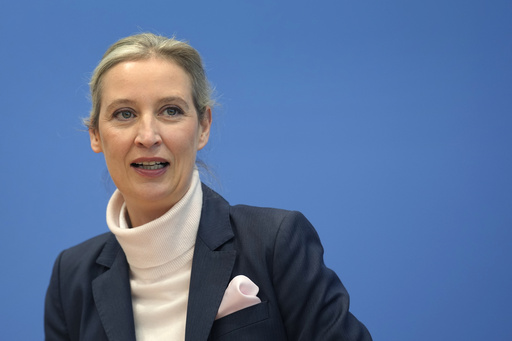BERLIN — Germany is on the brink of its second leadership transition in less than four years following the recent election that saw Friedrich Merz of the center-right opposition emerge victorious. This election also marked a noticeable increase in support for a far-right party, resulting in a significant defeat for outgoing Chancellor Olaf Scholz.
With Scholz’s three-party coalition collapsing last November, the responsibility now lies with Merz to bring stability back to Germany, Europe’s most populous nation as well as its economic powerhouse. However, he faces considerable challenges ahead.
Merz has a potential solution to form a government through a coalition with Scholz’s Social Democrats. Together, the Union and the Social Democrats hold 328 seats in the 630-seat parliament. He is optimistic about finalizing an agreement by Easter, a tight deadline that will require reconciling differing views on economic revitalization, as Germany’s economy has contracted for the past two years, and addressing irregular migration—a key issue during Merz’s campaign. Achieving this will demand considerable negotiation skills and a willingness to compromise.
Despite the challenges, Merz’s situation is somewhat easier than it could have been. There were hours of uncertainty on election night, during which it seemed that Merz might need to incorporate a third partner, the environmentalist Greens, to secure a parliamentary majority.
Germany’s traditional powerhouses are increasingly losing their grip on the political landscape. The Union and Social Democrats have seen a steady decline in support over the last two decades, with their combined electoral performance on Sunday being the lowest since the establishment of the federal republic in 1949. The Social Democrats achieved their weakest postwar result with only 16.4% of the vote, while the Union garnered 28.5%. This marked just the second time a winning party has recorded less than 30% of the total votes, the first being in 2021.
In the electoral map, the far-right Alternative for Germany (AfD) party emerged as the leading party in the less affluent east of the country, solidifying its dominance in a region where it previously won its first state election last year. While it trailed behind Merz’s Union in western Germany—where the majority of the population resides—AfD still managed to achieve a notable 20.8% of the national vote, marking a high point for far-right parties in postwar Germany.
Interestingly, even as AfD captured headlines with its gains, the Left Party also made a surprising resurgence. Initially perceived as a likely candidate for political extinction, it rallied to claim 8.8% of the vote. The Left Party attracted younger voters through progressive stances on social and immigration policies and a ‘tax-the-rich’ platform, enhanced by an adept social media strategy. The political climate became more polarized after a measure proposed by Merz to increase border restrictions was enacted. However, the conservatives have historically avoided collaboration with the Left Party, leaving no chance for it to support Merz in becoming Chancellor.
Regarding Germany’s international stance, Merz has been a vocal ally of Ukraine amid its conflict with Russia. He expressed his intentions to maintain support for Ukraine, insisting that it must remain strong in peace discussions. During Scholz’s administration, Germany became a significant arms supplier to Ukraine, second only to the United States. Merz has previously critiqued the outgoing administration for not doing enough and has advocated for supplying long-range missiles to Ukraine, which Scholz declined. He has so far been noncommittal on whether Germany may contribute to any potential peacekeeping forces, indicating that it’s too early for such discussions.
Scholz’s tenure saw him narrowly win in 2021 by presenting himself as a reliable choice for leadership. However, the quickly shifting dynamics brought on by the war in Ukraine and subsequent energy and inflation crises soon derailed his agenda. Over time, his coalition became infamous for internal conflicts and ineffective communication. Recently, Scholz hinted that he should have ended the coalition sooner than he did. As he attempted another comeback, discontent from voters and even within his party suggested that he had lost favor as Chancellor.




